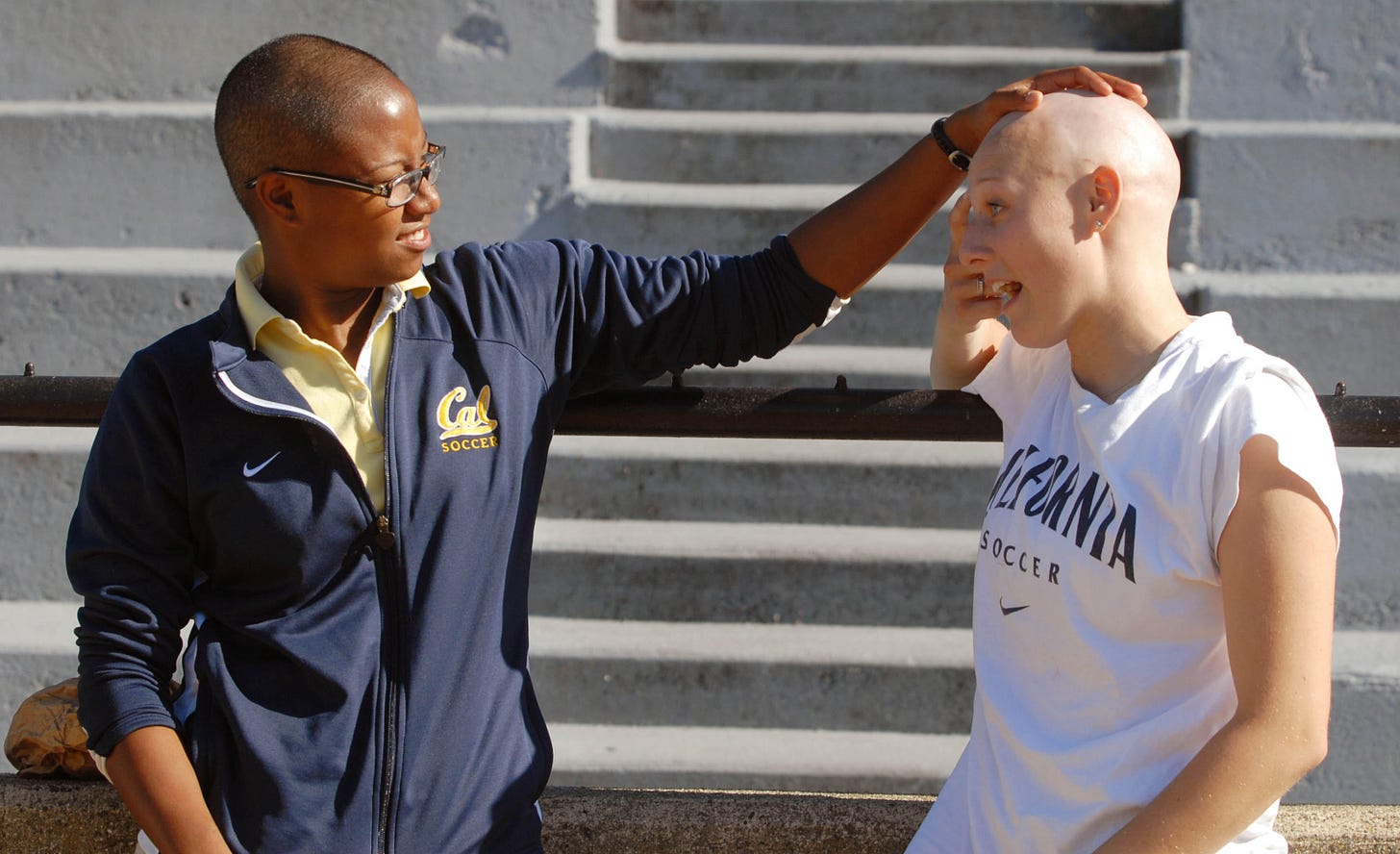What Shaving My Head Taught Me About Being a Woman
When I was a junior at Cal, my teammate on the soccer team was diagnosed with non-Hodgkin’s lymphoma. She went on chemo, and lost her hair. I wanted to do something meaningful to support her—something that might make her feel less alone, that might shoulder a bit of what she was carrying. So I decided to shave my head.
Scissors in hand, standing before the mirror in my apartment bathroom, I imagined a kind of Mulan-moment: shearing off my ponytail, transforming into some stronger, more formidable, more weaponizable version of myself.
Instead, bald, piles of my formerly lovely hair at my feet, I mostly just felt self-conscious. I didn’t feel emboldened or weaponized. I felt the opposite—self-conscious and insecure. I stepped away from the mirror. And, without a pair of clippers, retreated to my friend’s house. She routinely cut her boyfriend’s hair. She was the only person I knew with clippers.
I was bald. And my new head felt unnaturally cold. I threw on a beanie.
The beanie was still on my head when, later that week, I was in my safe place, Barnes & Noble. As I was checking out, the clerk, putting my books into a bag, looked up to me with a smile and said, “Thank you, sir.”
I’ve been called “Sir” many times since then, but that was the first time—and it threw me.
I walked back home, mind racing. Is this how people see me, I wondered? Is this actually who I am? Am I a sir?
Now, beyond self-conscious, I felt vulnerable, naked, exposed—unsafe. When I got back home, I gathered up my locks of chopped-off hair, sealed them in a big Ziploc bag, and sat on my bed holding the bag in my hands.
I hadn’t realized the extent to which I’d relied on my hair. Not just as a means of feeling good about myself—of feeling beautiful—but of passing: as straight, as feminine, as less Black, as less Asian. My hair—which was wavy and thick and fell past my shoulders in a natural-seeming way—served as a kind of armor. It had reflected and accentuated the dynamism of me: my mixed race, my various identities.
But it had also given me the privilege of self-protection. The hair in that bag represented a kind of power. With it, I could navigate the world with less fear or self-consciousness, as I could avoid asking myself certain hard-to-answer questions. About authenticity and what it requires. About representation. About standards of beauty and whether I was subconsciously perpetuating them. About self-expression and how to go about it. For example, is it superficial to recognize how relevant your hair is to your conception of self? On the one hand, hair is just hair; it’s not indicative of your character, your morality, your values. But on the other hand, hair can be a vehicle for both representation and self-expression. And the way we represent and express ourselves is very much indicative of our character—of the people we are, deep down.
In the weeks that passed after, I did my best to answer these questions and confront the ways in which I’d avoided them before. I’m still trying, of course. To be alive is in many ways to grapple with such questions.
But the effort I put into this was pretty quickly affirming. I had to become comfortable with myself sans armor. And I saw how the standards with which society defines things like femininity, or beauty, or what’s deserving of being called feminine, or beautiful, are by and large bullshit. The philosopher and queer theorist Judith Butler is great on this. “We act as if being a man or being a woman is actually an internal reality or something that is simply true about us,” she’s said. “But actually it’s a phenomenon that is being produced all the time and reproduced all the time.”
In other words, the standards and norms we abide by are artificial. And they’re not only reproduced all the time, but recreated all the time. They’re not divine or biological. They’re things we determine. This is actually liberating. Nobody gets to define your identity, your conception of self, or what about you is authentic except you.
I ultimately threw that gross Ziploc bag of my hair away. But I held onto it for several years—fearful, perhaps, that by throwing it away, I’d be giving up some element of myself that I might need down the line. But I’d learned to see myself as beautiful without hair. I wouldn’t dare grow it out now.
Of course, none of this was easy or anything. I hadn’t asked for this experience. I’d just wanted to help out a friend. In fact, I’m not sure I would have done what I did had I known what it would lead to— an interrogation of my complicity in the perpetuation of toxic structures, and an awakening to the reality of my own power: where it comes from, and where it does not.
But I’m grateful I did. The experiences that shape us—that wake us up; that reveal for us who we really are—aren’t supposed to be easy, or comfortable. They’re supposed to be hardening. Uncompromising. They inspire us to change. Perhaps more urgently, remind us that growth is not a choice. It’s our destiny.



